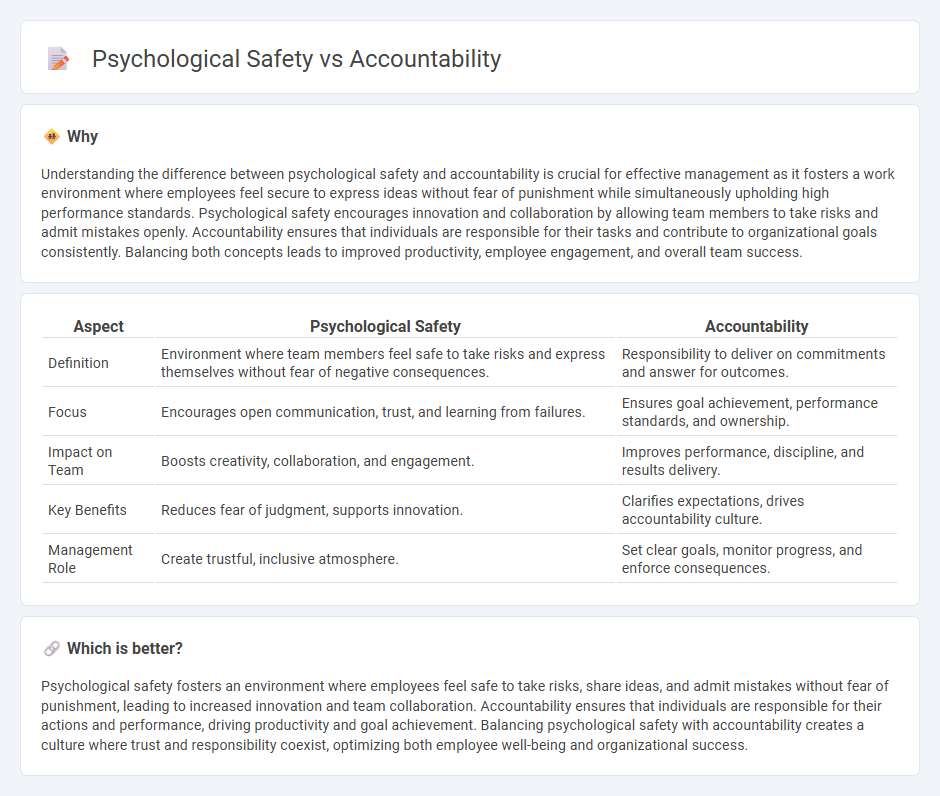
Psychological safety in management fosters an environment where team members feel secure to express ideas and take risks without fear of negative consequences, enhancing creativity and collaboration. Accountability ensures that individuals take responsibility for their actions and deliverables, driving performance and results within the organizational framework. Explore strategies to balance psychological safety and accountability for effective leadership and team success.
Why it is important
Understanding the difference between psychological safety and accountability is crucial for effective management as it fosters a work environment where employees feel secure to express ideas without fear of punishment while simultaneously upholding high performance standards. Psychological safety encourages innovation and collaboration by allowing team members to take risks and admit mistakes openly. Accountability ensures that individuals are responsible for their tasks and contribute to organizational goals consistently. Balancing both concepts leads to improved productivity, employee engagement, and overall team success.
Comparison Table
| Aspect | Psychological Safety | Accountability |
|---|---|---|
| Definition | Environment where team members feel safe to take risks and express themselves without fear of negative consequences. | Responsibility to deliver on commitments and answer for outcomes. |
| Focus | Encourages open communication, trust, and learning from failures. | Ensures goal achievement, performance standards, and ownership. |
| Impact on Team | Boosts creativity, collaboration, and engagement. | Improves performance, discipline, and results delivery. |
| Key Benefits | Reduces fear of judgment, supports innovation. | Clarifies expectations, drives accountability culture. |
| Management Role | Create trustful, inclusive atmosphere. | Set clear goals, monitor progress, and enforce consequences. |
Which is better?
Psychological safety fosters an environment where employees feel safe to take risks, share ideas, and admit mistakes without fear of punishment, leading to increased innovation and team collaboration. Accountability ensures that individuals are responsible for their actions and performance, driving productivity and goal achievement. Balancing psychological safety with accountability creates a culture where trust and responsibility coexist, optimizing both employee well-being and organizational success.
Connection
Psychological safety fosters an environment where team members feel secure to voice ideas and take risks without fear of negative consequences, which enhances overall accountability by encouraging ownership of actions. When individuals trust that their contributions are valued, they are more likely to hold themselves and others accountable for meeting goals and standards. This connection creates a culture of continuous improvement and transparent communication essential for effective management.
Key Terms
Responsibility
Accountability emphasizes the obligation to meet expectations and take ownership of outcomes, driving performance and reliability within teams. Psychological safety fosters an environment where individuals feel secure to express ideas and admit mistakes without fear of retribution, promoting learning and innovation. Explore how balancing accountability with psychological safety enhances responsibility and team success.
Trust
Accountability establishes clear expectations and responsibility for outcomes, while psychological safety fosters an environment where team members feel secure to express ideas and take risks without fear of punishment. Trust serves as the foundational element linking both concepts, enabling transparent communication and mutual respect essential for high-performing teams. Explore how balancing accountability and psychological safety through trust can transform your organizational culture.
Feedback
Accountability ensures clear expectations and consequences, driving performance through consistent feedback loops, while psychological safety fosters an environment where individuals feel safe to share ideas and admit mistakes without fear of judgment. Effective feedback combines these elements by promoting responsibility and encouraging open communication, essential for continuous improvement and team cohesion. Explore strategies to balance accountability and psychological safety for optimal feedback practices.
Source and External Links
Accountability - Accountability is the acknowledgment and assumption of responsibility for actions, decisions, and policies, involving accountability to others and oneself.
Accountability in the Workplace Examples - This article discusses examples of accountability in the workplace, including completing tasks on time and meeting performance expectations.
Accountability Can Have Positive Results - This resource outlines how accountability can lead to increased synergy and improved solutions by fostering a supportive environment.
 dowidth.com
dowidth.com